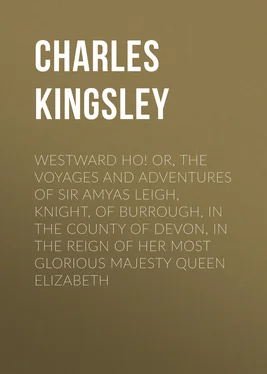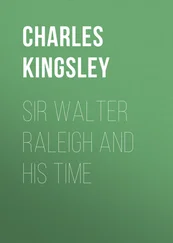And so Eustace was absolved; after which Campian added,—
“This is indeed well, my son: for there is a thing to be done now, but it may be at the risk of life.”
“Prove me!” cried Eustace, impatiently.
“Here is a letter which was brought me last night; no matter from whence; you can understand it better than I, and I longed to have shown it you, but that I feared my son had become—”
“You feared wrongly, then, my dear Father Campian.”
So Campian translated to him the cipher of the letter.
“This to Evan Morgans, gentleman, at Mr. Leigh’s house in Moorwinstow, Devonshire. News may be had by one who will go to the shore of Clovelly, any evening after the 25th of November, at dead low tide, and there watch for a boat, rowed by one with a red beard, and a Portugal by his speech. If he be asked, ‘How many?’ he will answer, ‘Eight hundred and one.’ Take his letters and read them. If the shore be watched, let him who comes show a light three times in a safe place under the cliff above the town; below is dangerous landing. Farewell, and expect great things!”
“I will go,” said Eustace; “to-morrow is the 25th, and I know a sure and easy place. Your friend seems to know these shores well.”
“Ah! what is it we do not know?” said Campian, with a mysterious smile. “And now?”
“And now, to prove to you how I trust to you, you shall come with me, and see this—the lady of whom I spoke, and judge for yourself whether my fault is not a venial one.”
“Ah, my son, have I not absolved you already? What have I to do with fair faces? Nevertheless, I will come, both to show you that I trust you, and it may be to help towards reclaiming a heretic, and saving a lost soul: who knows?”
So the two set out together; and, as it was appointed, they had just got to the top of the hill between Chapel and Stow mill, when up the lane came none other than Mistress Rose Salterne herself, in all the glories of a new scarlet hood, from under which her large dark languid eyes gleamed soft lightnings through poor Eustace’s heart and marrow. Up to them she tripped on delicate ankles and tiny feet, tall, lithe, and graceful, a true West-country lass; and as she passed them with a pretty blush and courtesy, even Campian looked back at the fair innocent creature, whose long dark curls, after the then country fashion, rolled down from beneath the hood below her waist, entangling the soul of Eustace Leigh within their glossy nets.
“There!” whispered he, trembling from head to foot. “Can you excuse me now?”
“I had excused you long ago;” said the kindhearted father. “Alas, that so much fair red and white should have been created only as a feast for worms!”
“A feast for gods, you mean!” cried Eustace, on whose common sense the naive absurdity of the last speech struck keenly; and then, as if to escape the scolding which he deserved for his heathenry—
“Will you let me return for a moment? I will follow you: let me go!”
Campian saw that it was of no use to say no, and nodded. Eustace darted from his side, and running across a field, met Rose full at the next turn of the road.
She started, and gave a pretty little shriek.
“Mr. Leigh! I thought you had gone forward.”
“I came back to speak to you, Rose—Mistress Salterne, I mean.”
“To me?”
“To you I must speak, tell you all, or die!” And he pressed up close to her. She shrank back, somewhat frightened.
“Do not stir; do not go, I implore you! Rose, only hear me!” And fiercely and passionately seizing her by the hand, he poured out the whole story of his love, heaping her with every fantastic epithet of admiration which he could devise.
There was little, perhaps, of all his words which Rose had not heard many a time before; but there was a quiver in his voice, and a fire in his eye, from which she shrank by instinct.
“Let me go!” she said; “you are too rough, sir!”
“Ay!” he said, seizing now both her hands, “rougher, perhaps, than the gay gallants of Bideford, who serenade you, and write sonnets to you, and send you posies. Rougher, but more loving, Rose! Do not turn away! I shall die if you take your eyes off me! Tell me,—tell me, now here—this moment—before we part—if I may love you!”
“Go away!” she answered, struggling, and bursting into tears. “This is too rude. If I am but a merchant’s daughter. I am God’s child. Remember that I am alone. Leave me; go! or I will call for help!”
Eustace had heard or read somewhere that such expressions in a woman’s mouth were mere facons de parler, and on the whole signs that she had no objection to be alone, and did not intend to call for help; and he only grasped her hands the more fiercely, and looked into her face with keen and hungry eyes; but she was in earnest, nevertheless, and a loud shriek made him aware that, if he wished to save his own good name, he must go: but there was one question, for an answer to which he would risk his very life.
“Yes, proud woman! I thought so! Some one of those gay gallants has been beforehand with me. Tell me who—”
But she broke from him, and passed him, and fled down the lane.
“Mark it!” cried he, after her. “You shall rue the day when you despised Eustace Leigh! Mark it, proud beauty!” And he turned back to join Campian, who stood in some trepidation.
“You have not hurt the maiden, my son? I thought I heard a scream.”
“Hurt her! No. Would God that she were dead, nevertheless, and I by her! Say no more to me, father. We will home.” Even Campian knew enough of the world to guess what had happened, and they both hurried home in silence.
And so Eustace Leigh played his move, and lost it.
Poor little Rose, having run nearly to Chapel, stopped for very shame, and walked quietly by the cottages which stood opposite the gate, and then turned up the lane towards Moorwinstow village, whither she was bound. But on second thoughts, she felt herself so “red and flustered,” that she was afraid of going into the village, for fear (as she said to herself) of making people talk, and so, turning into a by-path, struck away toward the cliffs, to cool her blushes in the sea-breeze. And there finding a quiet grassy nook beneath the crest of the rocks, she sat down on the turf, and fell into a great meditation.
Rose Salterne was a thorough specimen of a West-coast maiden, full of passionate impulsive affections, and wild dreamy imaginations, a fit subject, as the North-Devon women are still, for all romantic and gentle superstitions. Left early without mother’s care, she had fed her fancy upon the legends and ballads of her native land, till she believed—what did she not believe?—of mermaids and pixies, charms and witches, dreams and omens, and all that world of magic in which most of the countrywomen, and countrymen too, believed firmly enough but twenty years ago. Then her father’s house was seldom without some merchant, or sea-captain from foreign parts, who, like Othello, had his tales of—
“Antres vast, and deserts idle,
Of rough quarries, rocks, and hills whose heads reach heaven.”
And,—
“And of the cannibals that each other eat,
The anthropophagi, and men whose heads
Do grow beneath their shoulders.”
All which tales, she, like Desdemona, devoured with greedy ears, whenever she could “the house affairs with haste despatch.” And when these failed, there was still boundless store of wonders open to her in old romances which were then to be found in every English house of the better class. The Legend of King Arthur, Florice and Blancheflour, Sir Ysumbras, Sir Guy of Warwick, Palamon and Arcite, and the Romaunt of the Rose, were with her text-books and canonical authorities. And lucky it was, perhaps, for her that Sidney’s Arcadia was still in petto, or Mr. Frank (who had already seen the first book or two in manuscript, and extolled it above all books past, present, or to come) would have surely brought a copy down for Rose, and thereby have turned her poor little flighty brains upside down forever. And with her head full of these, it was no wonder if she had likened herself of late more than once to some of those peerless princesses of old, for whose fair hand paladins and kaisers thundered against each other in tilted field; and perhaps she would not have been sorry (provided, of course, no one was killed) if duels, and passages of arms in honor of her, as her father reasonably dreaded, had actually taken place.
Читать дальше












